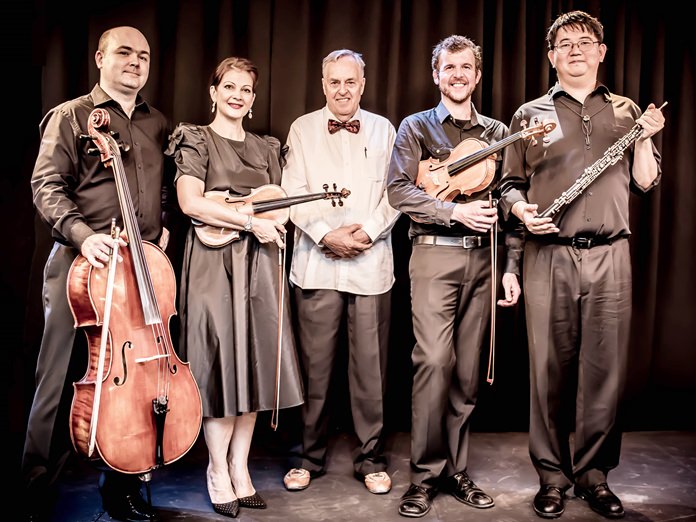It was virtually a packed house at Ben’s Theater in Jomtien recently for what turned out to be one of the most successful concerts ever held there. It featured four of the top musicians from the Thailand Philharmonic Orchestra, considered by many to be the finest orchestra in the Kingdom. The Salaya Ensemble consists of oboist Cooper Wright (Solo Principal Oboe), violinist Inga Causa (Acting Concertmaster), Dr Danny Keasler (Principal Viola) and Marcin Szawelski (Co-Principal Cello). With talent like this there was enormous anticipation and excitement among the concert-goers gathered in Jomtien. They were not disappointed.

The programme items were performed in chronological order ranging from a work composed in the mid-1770s to a piece written in 2016 – last month to be precise. The concert opened with a performance of Johann Christian Bach’s graceful Quartet in B flat major. John Christian was one of the sons of Johann Sebastian and often known as “The London Bach” because he lived there for many years.
The Salaya Quartet impressed with their sheer quality of sound, beautiful singing oboe tone and a rich sonorous sound from the strings. Oboist Cooper Wright brought a sense of joy to the first movement with its wealth of melody and cleverly written answering phrases between the instruments. The second movement, an elegant rondo was especially rewarding and included an attractive solo passage for viola, beautifully played by Danny Keasler.
Mozart’s Oboe Quartet K.370 dates from1781 and it’s the most well-known in the oboe quartet repertoire. It contains many of Mozart’s favourite musical trade-marks: twists of harmony, wide melodic leaps, unexpected accents, skillfully written counterpoint and elements of surprise. Despite the technical challenges of the piece, Cooper’s oboe playing was superb throughout and there was some fine string playing. The sense of ensemble was excellent, the four players blending their sounds together perfectly.
I suspect that many non-musicians don’t realise how much personal practising and group rehearsal goes into the making of a concert performance. It became clear that these four fine musicians had spent a considerable time doing just that. The gently lilting slow movement of Mozart’s quartet was beautifully played and the sprightly third movement was brilliant with its virtuosic oboe part. Several times Mozart writes a top F – the highest note available on the instrument in the eighteenth century. Even today, oboists consider the top F a bit tricky. Cooper played these high notes with superb tone and control.
The balance between the instruments was excellent and the inner parts clearly audible. The acoustic at Ben’s Theater is ideal for music of this sort: the room is large enough for a decent-sized audience yet small enough to preserve the intimate nature of chamber music.
Ludwig van Beethoven composed his Serenade for String Trio in D major during the years 1796 and 1797. In the late eighteenth century, composers wrote serenades and divertimenti to satisfy the needs of the courts at which background music was necessary for social events. Little is known of the origins of this Beethoven work but by the usual standards of the serenade, it’s quite complex, even puzzling at times.
The string players performed the third movement of the Serenade which gave them the opportunity to shine. I was impressed by the beautiful string tone, the fine articulation in the faster sections and the delicate expressive playing. The movement alternates between a wistful, passionate melody tellingly played by Inga (violin) and Danny (viola) with a carefully phrased cello accompaniment from Marcin. The changes of tempo and mood between this and the scherzo-like faster passages were perfectly handled by the musicians and the sense of ensemble was compelling.
Benjamin Britten was sixteen when he wrote his Phantasy Quartet for Oboe and String Trio in 1932. It’s a challenging work for the performers and possibly for the listeners too, if they’re not familiar with Britten’s harmonic style. The work has echoes of Stravinsky and makes considerable use of pizzicato strings with strident, vibrant harmonies. The difficult oboe part was expertly handled by Cooper and there was a wonderful sense of timing and precision with some fine string playing especially in the opening and closing sections.
After a rapturous response from the audience, the quartet played their encore piece, composed only a few weeks ago especially for the occasion by local composer Colin Kirkpatrick. The musicians played the short and lively work superbly and at the end there were some cheers from the audience. Unusually, after the applause had faded away, everyone remained in their seats. It really looked as though no one wanted to go home.




